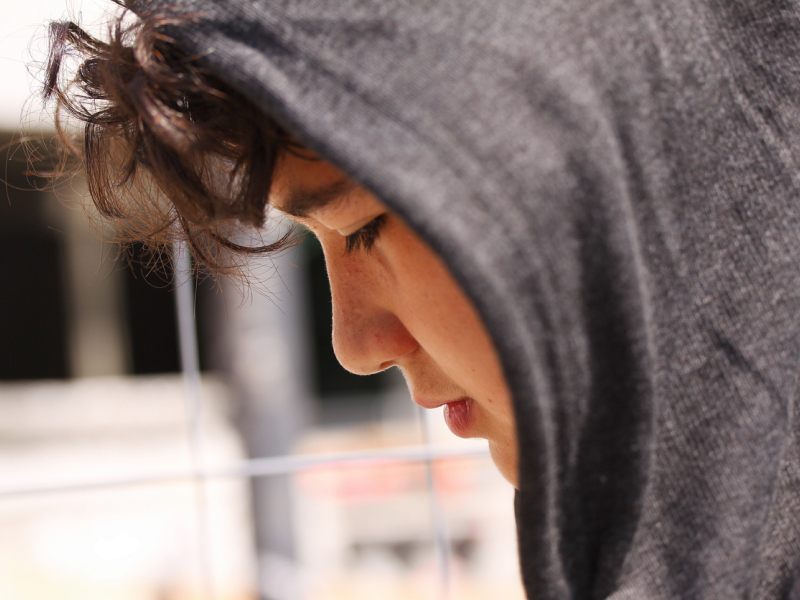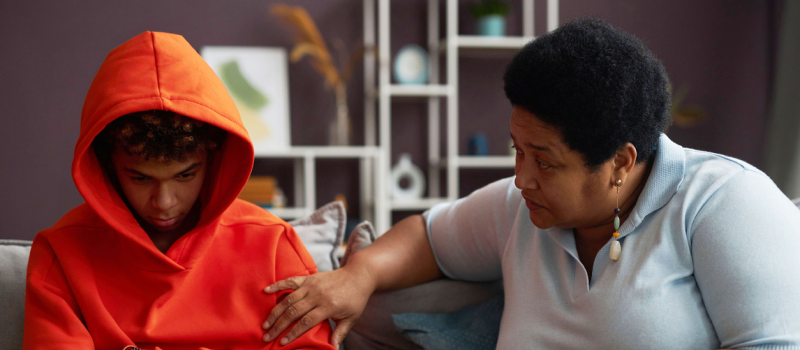
Table of Contents
Oppositional Defiant Disorder vs Conduct Disorder: What’s the Difference?

Written By: Ashley Laderer

Clinically Reviewed By: Dr. Don Gasparini
April 10, 2024
6 min.
Is your child or teen engaging in problematic aggressive behaviors? Read on to learn more about two disruptive behavior disorders: oppositional defiant disorder (ODD) and conduct disorder.
Learn more about our Clinical Review Process
Table of Contents
Arguing with authority figures, constantly breaking the rules, and losing your temper could be signs of disruptive behavior disorders. Two of the most common disruptive behavior disorders are oppositional defiant disorder (ODD) and conduct disorder. These disorders are most prevalent in children and teens, greatly affecting their lives at home, school, and at large.
Although these two disruptive behavior disorders do have some overlap, it’s important to understand the differences between ODD and conduct disorder. If you think your child or teen could have a behavior disorder, it’s crucial to get a diagnosis, educate yourself, and work with a professional to develop an effective treatment plan. Read on to learn more about ODD and conduct disorder from an expert and see the similarities and differences between the two.

Personalized, intensive mental health support
We make managing serious mental health conditions possible.
Oppositional defiant disorder vs conduct disorder: an overview
When a person has a disruptive behavior disorder like ODD or conduct disorder, they struggle with self-control of aggressive behaviors. The problem behaviors can range from verbal arguments to inflicting physical harm on someone or committing other crimes. Signs of these disorders often begin in childhood or teen years. Before we dive into their key similarities and differences, here’s an introduction to ODD and conduct disorder.
Oppositional defiant disorder
ODD is a disorder characterized by ongoing patterns of anger, irritability, and acting disobediently in response to authority figures, such as parents or teachers. The average age of onset for this disorder is eight years old.
“If they are challenged by somebody, especially parents or an authority figure, they will immediately rise to that challenge and then do the opposite of what that person is asking for,” says Julie A. Eggleston, MS, CTRS, an Experiential Therapist with Charlie Health. For example, if a teacher tells someone with ODD that they need to sit down and pay attention, they may respond by running around the room or starting an argument, Eggleston says. ODD symptoms fall into three categories: anger and irritability, argumentative and defiant behavior, and vindictiveness.
Conduct disorder
Conduct disorder is characterized by aggressive behavior, rule-breaking, and engaging in many defiant –– and often dangerous –– behaviors. The severity varies greatly from mild cases (where someone might break their parents’ rules about curfew) to severe cases (where someone might use a weapon to hurt someone). The average onset is around 10 to 12 years old in boys and 14 to 16 years old in girls.
The disobedience associated with conduct disorder can get a young person into a lot of trouble, even with the law. Oftentimes, the person with conduct disorder lacks empathy, Eggleston says. This means they might not feel bad or have remorse for hurting other people.
The symptoms of conduct disorder fall into four categories: aggression toward people and animals, destruction of property, deceitfulness or theft, and serious violations of rules.

What are the similarities between oppositional defiant disorder and conduct disorder?
Both of these disruptive behavior disorders can be very, well, disruptive. The out-of-line behavior exhibited by people with ODD and conduct disorder can majorly impact someone’s life at home, school, and in their community. “The main similarities are risky behavior, aggression, and hurtful behavior,” Eggleston says. Both disorders can result in impaired relationships due to this behavior. On top of this, both disorders involve persistent rule-breaking that can get people into a lot of trouble.
Additionally, both disorders commonly co-occur with other disorders. One of the most common comorbidities for conduct disorder and ODD is attention-deficit/hyperactivity disorder (ADHD). Other disorders that might co-occur with ODD or conduct disorder are:
- Anxiety disorders
- Mood disorders (such as bipolar disorder or depression)
- Autism spectrum disorder (ASD)
What are the differences between oppositional defiant disorder and conduct disorder?
Despite some crossover in symptoms, there are distinct differentiating factors that separate ODD from conduct disorder. One key difference is that people with ODD typically engage in disruptive behaviors because they are doing the opposite of what an authority figure is telling them to do, whereas those with conduct disorder are simply pushing the risky behavior limit, Eggleston says.
Furthermore, the problematic behavior in conduct disorder extends to far more areas and may be much more severe. For example, while someone with ODD may get angry, argumentative, and break an authority figure’s rules, they likely won’t engage in behaviors like hurting animals, sexually assaulting someone, or lighting someone’s property on fire. Behavior related to conduct disorder is more dangerous and law-breaking than behavior linked to ODD –– such as rape, theft, or arson.
Additionally, it is more common for conduct disorder to evolve into antisocial personality disorder (sometimes referred to as sociopathy) later in life rather than ODD. According to the American Psychiatric Association, 40% of those with conduct disorder will later meet the criteria for antisocial personality disorder.
Treatment for disruptive behavior disorders
Correct diagnosis and treatment are crucial for the best outcome for people with ODD and conduct disorder. Treatment for disruptive behavior disorders such as ODD or conduct disorder typically involves a mix of approaches, addressing both the individual with the disorder and their family. Here are some examples of treatment approaches for helping a child or teen with a disruptive behavior disorder:
Parent management training (PMT)
Since a child or teen’s disruptive behavior disorder greatly impacts their parents, PMT is an important part of treatment. Parents will learn how to best discipline the child, reduce the frequency of troubling behaviors, and reward and reinforce healthy, positive behaviors. PMT is sometimes also referred to as parent behavior therapy.
Additionally, Eggleston says maintaining structure is important for kids and teens with ODD or conduct disorder, and PMT can help parents learn the best way to do this. Parents will also learn how to improve their relationship with their child and communicate healthily. When the skills learned in parent management training are applied correctly, they can make a huge difference in a child or teen’s behavior.
Psychotherapy
Psychotherapy (AKA talk therapy) is an important part of treatment for individuals with disruptive behavior disorders. Cognitive behavioral therapy (CBT) is a popular type of psychotherapy that helps people learn about how their thoughts, feelings, and behaviors are interconnected. A CBT therapist can work through unhealthy thought patterns and problem behaviors to create healthier ones. Anger management can also go hand in hand with CBT, teaching people with anger issues to relieve the emotion and deal with it in a healthier way than acting out.
Another form of psychotherapy is family-focused therapy (FFT), which includes sessions with the parents and child together. In FFT, the family will receive psychoeducation on the disruptive behavior disorder you’re dealing with and learn how to communicate and resolve conflict in a positive, healthy way.
Medication
There are no medications that specifically treat disruptive behavior disorders like ODD or conduct disorder. However, if there’s a co-occurring disorder, such as ADHD, which might be worsening the symptoms of the disruptive disorder, medication to treat that condition may help overall. Medication could also help if an anxiety disorder or mood disorder is involved, too.

How Charlie Health can help
If a young person in your life is struggling with a disruptive behavior disorder or another mental health condition, Charlie Health is here to help. Charlie Health offers a virtual Intensive Outpatient Program (IOP) that provides more than once-weekly mental health treatment for young people and families dealing with serious mental health conditions. Our clinicians use evidence-based therapy modalities in individual therapy, group sessions, and family therapy. Young people can connect with peers who deal with similar struggles, and parents can even join their own support groups. With this kind of holistic treatment, managing your mental health is possible. Fill out the form below or give us a call to start healing today.
References
https://www.cdc.gov/childrensmentalhealth/features/kf-disruptive-behavior.html
https://my.clevelandclinic.org/health/diseases/9905-oppositional-defiant-disorder
https://www.ncbi.nlm.nih.gov/books/NBK519712/table/ch3.t14/
https://www.ncbi.nlm.nih.gov/books/NBK519712/table/ch3.t13/
https://my.clevelandclinic.org/health/diseases/23924-conduct-disorder
https://www.ncbi.nlm.nih.gov/pmc/articles/PMC3057683/
https://academic.oup.com/book/43976/chapter-abstract/369515741?redirectedFrom=fulltext




